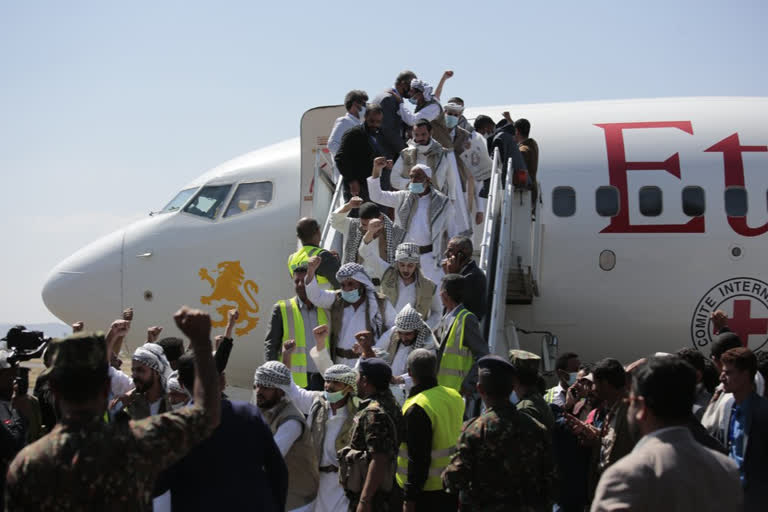Sanaa: Yemen's warring sides on Thursday kicked off a long-awaited, the UN-brokered prisoner exchange with an unprecedented release of detainees amid a conflict that spawned the world's worst humanitarian crisis.
The exchange came a day after Yemen's Iran-backed rebels released two Americans and the remains of the third who had died in captivity. It was not immediately clear if the swap, which was planned for over a year, was related to the release of the Americans on Wednesday.
The release was part of the U N mediated deal between the rebel Houthis and a Saudi-backed coalition supporting Yemen's internationally recognized government in the yearslong civil war. More than 1,000 prisoners were expected to be exchanged in a swap, which would continue on Friday.
The conflict in the Arab world's poorest country erupted in 2014 when the Houthis seized the capital, Sanaa and much of the country's north. The Saudi-led coalition, backed by the US, launched a military intervention months later to restore Yemeni President Abed Rabu Mansour Hadi's government to power.
The International Committee of the Red Cross in Yemen, which coordinated the swap, said a total of 700 prisoners from both sides were freed on Thursday. Fabrizio Carboni, ICRC's regional director for the Middle East, said the operation was the first step towards building the confidence needed between parties to the conflict.
A rebel-run satellite TV channel broadcasted the start of the swap, as three planes carrying freed Houthi prisoners touched down in Sanaa. The men kneeled on the tarmac, bowed their heads to the ground in prayer and embraced relatives.
Read: Al Qaeda urges Indian Muslims to wage jihad against India
Another two planes took off from Sanaa, one carrying freed Yemeni government prisoners and another carrying 15 Saudis and four Sudanese who had fought alongside government forces, the Houthis' Al-Masirah TV said. The planes later landed at Seyun airport in southern Yemen and Riyadh in Saudi Arabia.
Last month, the UN announced that the Houthis and the government side had agreed to exchange more than 1,000 prisoners, marking the first phase of a prisoner-release plan reached earlier this year.
Since this morning, the skies of Yemen witnessed an airlift of hope, the UN special envoy for Yemen Martin Griffiths told the UN Security Council on Thursday. He called for civilians arbitrarily detained during the war to also be released, including journalists and political prisoners.
Griffiths told reporters the exchange would be the largest run by ICRC since the Korean War and estimated there were thousands of more prisoners who were held captive by both sides.
Hundreds of Houthi politicians and military commanders lined up on the tarmac in Sanaa, where a red carpet was rolled out and a military band played. As the released rebels disembarked, all in white robes, they raised clenched fists and chanted "God is Great, Death to America and Israel" a common Houthi chant that identified their movement with that of Iran's government, with Israel as the regional enemy.
Later Thursday, the Saudi-owned Al-Arabiya TV aired live footage of freed Yemeni government prisoners disembarking from their plane in Seyun in the eastern province of Hadramawt, which was controlled by forces loyal to Yemen's Saudi-backed government.
Earlier, Abdel Qader Mortada, the head of the Houthi Committee for Prisoners Affairs, told reporters that another 200 Houthi rebels and 150 government prisoners were expected to be released on Friday.
The prisoner-swap deal was seen as a breakthrough during 2018 the UN-brokered peace talks in Sweden. Both parties agreed then to several confidence-building measures, including a cease-fire in the strategic port city of Hodeida. Implementation of the tentative peace plan, however, stumbled amid ongoing military offensives and distrust between the two sides.
Houthi Information Minister Daif Allah al-Shamy hailed the swap as a 'huge step' and said that the rebels would seek further exchanges.
Occasional releases of dozens of prisoners over the past two years served as gestures of good faith, stoking hopes the factions would implement what the U N described as the war's first official large-scale exchange. The two sides committed earlier this year to swap over 1,400 detainees.
On Wednesday, the Houthis freed U S citizens Sandra Loli and Mikael Gidada and released the remains of Bilal Fateen, the White House and officials in the region said. That development was apparently the result of mediation by Oman, which acted as a mediator in the Mideast.
Kieran Ramsey, director of the administration's hostage recovery cell, said Loli and Gidada would soon be on their way back to the United States. Kash Patel, a deputy assistant to President Donald Trump who worked on the deal, told The Wall Street Journal that Loli had been held by the Houthis for about three years and Gidada was held captive for about a year.
The Houthis, who did not comment on the release of the Americans, said Wednesday about 240 rebels returned to Sanaa on two Omani flights. Among the returnees were wounded rebels who travelled to Muscat during peace talks in Sweden two years ago.
The war in Yemen left millions suffering from food and medical shortages. It killed more than 112,000 people, including fighters and civilians, according to a database project that tracks violence.
(AP)
Also read: What impact is COVID-19 having on Middle East conflicts?



